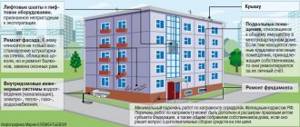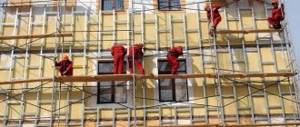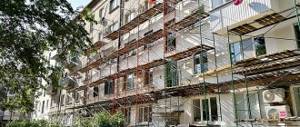Until 2014, fees for major repairs were not charged to owners of apartments in multi-apartment buildings. This obligation arose following amendments to housing legislation. Of course, the additional fee outrages the owners. Moreover, quite often a receipt for a significant amount arrives. Let's figure out whether or not to pay for major repairs of apartment buildings.
In accordance with the provisions adopted in housing legislation, major repairs of residential buildings are carried out at the expense of funds accumulated in the account of the management company. In the future, the collected amount will be spent on paying for repairs and purchasing building materials. At the same time, many citizens refuse such levies and stop paying. Is this legal? Let's try to figure it out.
Is this legal?
Despite the fact that several years have passed since the collection began, doubts about the legality of the decision to pay for capital repairs still remain. Why is this happening?
When speaking about the illegality of collecting funds for this expense item, lawyers refer to tax legislation. It directly states that it is prohibited to introduce additional taxes and fees not provided for by the Tax Code. It still does not contain information about major repairs.
However, these payments are discussed in the provisions of the Housing Code. This becomes the basis for government authorities to assert the legality of the introduced fee.
Despite the obvious ambiguity in the legislation, timely payment of utility bills is the responsibility of homeowners. The contribution for major repairs was introduced by the state. For ignoring this requirement, the authorities charge penalties, force them to pay fees in court, etc.
When property is transferred to a legal successor on the basis of inheritance, donation, purchase and sale or other civil law transactions, the new owner assumes obligations to pay utilities and fees. However, if due to the fault of the previous owner arrears in payments for major repairs were formed, the new owner will have to pay it.
The requirement to make full contributions is generally justified. In houses that have been in service for decades, emergency situations quite often occur - a water pipe break, cracks in the walls and their collapse, etc. To prevent these troubles, regular maintenance is required to take action. Major repairs are not financed from the state or municipal treasury, so apartment owners have to pay for their own safe living.
Specifically, this issue is regulated by the following regulations:
- Art. 169 of the Housing Code of the Russian Federation says that residents must raise money for restoration work and reconstruction of apartment buildings on their own;
- Art. 157.1 of the Housing Code of the Russian Federation states that paying fees to specially formed funds is the responsibility of apartment owners.
Some categories of citizens are exempt from paying for major repairs. We'll talk about benefits and tariffs further.
What happens if you don’t pay for major repairs?
Many citizens do not see the need to pay for major repairs. They believe that investing in the promise of ever improving the technical condition of the house is, to say the least, unreasonable.
Why is this happening? There are several reasons for this:
- Rehabilitation programs for apartment buildings do not have clear deadlines. This calls into question the intended use of the collected funds.
- Lack of transparency in financial reporting. Residents do not know how much money has already been collected and where it is being spent.
- Premises for common use (stairs, flights, non-residential premises, etc.) are most often the property of the municipality. However, the money collected can also be used for their restoration.
- Not all residents use the property for which funds are being raised for renovation. For example, the owners of apartments on the ground floor do not use elevators, but they pay money for its restoration.
What happens if you don't pay for major repairs? To begin, the municipality will try to contact the defaulter by telephone or mail. The owner will receive notification of the debt and the need to repay it.
Penalties for the resulting debt will be taken into account on the monthly receipt. Their size can vary from 0.5 to 5% of the payment amount.
If the owner does not pay the debt within six months, the issue may be referred to the court. During the trial, the court will be asked to justify its refusal to pay contributions for major repairs. If the owner cannot provide a valid justification, then, most likely, the court will impose an obligation to pay the debt, pay off penalties and cover the legal costs incurred by the plaintiff.
Tariff for major repairs in 2020
In accordance with current legislation, one family cannot spend more than 10% of the budget on paying for utilities and carrying out major repairs. At the same time, prices rise depending on the rise in inflation.
Thus, indexation of tariffs for utilities and contributions for major repairs is carried out annually. In addition, the amount of payment may be increased by making an appropriate decision at a meeting of homeowners. This happens if any urgent repair work is required.
Is the contribution for major repairs a public service or not?
MKD belong to the category of current costs. Other work carried out above the recommended list is work of a capital nature. Costs allocated by residents of residential buildings can be used for capital works for the following types of work:
It is recommended that the amount of contributions be developed by each management company depending on the category of housing, the period of commissioning of the residential property, and the degree of improvement of the house. The calculated amounts must not be below the regulatory minimum. The amount of contributions is discussed at a general meeting of residents of the house, regardless of its form of ownership. Funds received from the owners of square meters are accumulated in a current account in the target FKR. Thus, the Federal Law delegated the rights to co-owners of housing and non-residential premises to be jointly and severally responsible for the technical situation of apartment buildings. The need for major repairs is accepted by residents participating in the formation of the Major Repair Fund.
Benefits on contributions for major repairs
Contributions for major repairs are not paid by persons who live in the apartment, but are not its owners. These persons include people living:
- on the basis of a social tenancy agreement;
- under a lease agreement;
- together with the apartment owners, etc.
Under certain circumstances, the owners of an apartment building may be exempt from the need to transfer contributions for major repairs. This happens in the following cases:
Dear readers! We cover standard methods for solving legal problems, but your case may be unique. We will help you find a solution to your problem for free
– simply call our legal consultant at:
+7( (Saint Petersburg)
It's fast and free ! You can also quickly get an answer through the consultant form on the website.
- the house is recognized as unsafe;
- there are no more than two apartments in the house;
- the land plot on which the apartment building was built was seized by the state;
- the house was put into operation no more than five years ago (the period may vary depending on the region).
It is worth noting that owners of non-residential premises in apartment buildings are not exempt from making contributions for major repairs.
Preferential conditions for paying contributions for major repairs are established for owners who cannot transfer the amount in full due to insolvency, as well as for those citizens who have earned state support. Such persons include:
- citizens who suffered as a result of political repression;
- combat veterans;
- citizens participating in the liquidation of the consequences of the Chernobyl accident;
- labor veterans;
- widows who lost their breadwinners as a result of hostilities;
- teachers in rural areas;
- large families;
- other categories of citizens who fall under preferential conditions.
Regulatory acts of regional legislation may establish additional categories of citizens who are entitled to receive benefits.
The size of the benefit depends on the region, as well as on membership in a certain category. For example, labor veterans can count on 50%, and large families on 30%.
Benefits are calculated by regional social security institutions. Funds for major repairs can be reimbursed from the regional and federal budgets.
Is a major repair a public service?
And according to clause 2 of Art. 66 If the landlord of a residential premises fails or improperly fulfills his obligations under a social tenancy agreement to carry out timely major repairs of the rented residential premises , common property in an apartment building and devices located in the residential premises and intended for the provision of utilities, the tenant, at his choice, has the right to demand a reduction payments for the use of occupied residential premises, common property in an apartment building, or reimbursement of one’s expenses for eliminating deficiencies in the residential premises and
Hello, help me figure out whether major repairs are a public service, i.e. Is it possible to say that the landlord’s failure to carry out major repairs is not the provision of a utility service to the tenant? I am writing on behalf of the tenants of our house, we want to start defending our rights in the administration, since the house has not undergone major repairs since 1952, but by paying for rent, We automatically pay for major repairs. or are we wrong? We will be grateful for your advice.
This is interesting: Transport Tax Latest News
How to refuse major renovations of an apartment building
Despite the fact that the owner faces various unpleasant measures for failure to pay contributions for major repairs, it is possible to refuse to transfer payments on legal grounds.
For example, if an apartment is rented out and the owner himself does not live there, the responsibility for paying contributions for major repairs can be transferred to the tenants. It is logical to assume that if they live in a living space for a long time, then they are interested in providing comfortable living conditions.
Residents of the building can collectively refuse to pay for repairs from the fund. Then they will have to do their own repairs and maintenance. In this case, it will not be possible to avoid contributions, but payments will be collected as needed for a specific purpose.
A modern and convenient option for everyone is placing advertising banners on the facade of the house. Renting advertising space will cover all costs of major repairs. At the same time, the family budget of the residents will not suffer.
There are no other legal ways to avoid paying for major repairs. If you try to avoid fulfilling this obligation, not only administrative, but also criminal punishment is possible.
Major and current repairs. What is the difference
It is very important to distinguish between major and current repairs. A correct understanding of these concepts makes it possible to apply your rights in the housing sector.
An example of a housing relationship is the rental of premises, on the basis of which the tenant is responsible for performing current work, and the landlord, in turn, is responsible for capital work. The use of funds for these types of repair work comes from different resources. These two options are distinguished depending on the goals, repeatability and amount of work required.
Current repairs are a set of regular measures, which are carried out in order to prevent premature deterioration of structures, finishing elements, as well as manipulations to eliminate minor defects and damage.
A methodological manual for the maintenance and repair of housing stock (January 2-02, 2004), approved by the Federal Agency for Construction and Housing and Communal Services, which is now referred to as the Ministry of Construction, contains approximate actions necessary when carrying out ongoing work.
Current repairs, or, as they are also called, scheduled maintenance, are carried out much more often than major ones. Requires less financial investment. Does not provide for the need for temporary cessation of use of the building by residents.
When carrying out a major overhaul, a part of the building that has become completely worn out is restored, and the current one implies maintaining the elements of the construction project in a state of operability for the required period of time. An example of ongoing updates is the restoration of a separate section of the flooring of the entrance. Replacing flooring throughout a facility can be considered a type of capital renovation.
Funding for current work comes from management companies, whose funds are replenished from residents’ rent payments. Targeted payments from homeowners are aimed at capital repairs.
In addition to this, reconstruction measures should be distinguished from capital ones. Reconstruction of a building involves changing the number of floors, area of premises, as well as replacing the main structures of the facility.
Do they pay for major repairs of a new building?
Housing legislation exempts homeowners in new buildings from paying contributions for major repairs. The release period is five years.
However, new buildings may require ongoing renovation work. For example, over a five-year period of continuous use, many communications can wear out significantly. For this reason, a separate column is often included in utility bills. This is a fee for ongoing repair work.
Problems with the receipt
Some owners are faced with the fact that they do not receive a receipt for paying the contribution for major repairs. Another common problem is that the previous owner of the apartment is indicated on the receipt. Should I pay in such cases? How to put your documents in order?
Is not coming
It happens that receipts arrive late or do not arrive at all. Of course, this does not mean that you do not need to pay a fee.
Most often, receipts for major repairs do not arrive due to the fault of the management company. To resolve this issue, you need to contact the organization and declare the absence of payments.
You shouldn’t think that if you don’t say that there are no receipts, then no one will oblige you to pay. You will still have to pay, only a payment document can come for the amount accumulated over the year. It is better to apply on time to avoid financial problems in the future.
How to change the owner on a receipt
If the receipt for major repairs indicates a different owner, you must contact the account holder and update the information. To do this, you must provide an extract from the Unified State Register or a certificate of ownership.
Some funds offer the ability to send documents remotely. This needs to be clarified with the management company.
If difficulties arise, please seek legal advice. You can get free legal assistance on our website. in a special window.
The answer to the question whether or not to pay for major repairs of apartment buildings is obvious - pay. Otherwise, penalties may apply. If your rights or legitimate interests have been violated, contact a lawyer as soon as possible. You can do this on our website.
What are the tariffs for housing maintenance and repair based on?
First of all, we will look at what the amount indicated in the receipt for payment for maintenance and repair of housing, common property of an apartment building, and premises consists of. Payment for this service is also withdrawn from citizens living in municipal and state apartments, especially for work classified as repairs. However, in the case of municipal housing, this payment is hidden in the payment column for renting an apartment, since according to the law, repairs are the responsibility of the municipality.
- renting an apartment, if it is not privatized and is owned by the municipality;
- repair of actual housing, living quarters, house;
- maintenance and servicing of premises for common use of a residential building;
- major renovation of an apartment building and its property.
06 Aug 2020 consurist 739
Share this post
- Related Posts
- Sample insurance contract
- Cadastral public map of premises
- How to find out your housing and communal services debt online
- Is it possible to change the Compulsory Medical Insurance Policy in MFC when changing your last name?
Alexey Nyankin, lawyer at the Nyankin and Partners law office, answers:
In accordance with part 2 of Art. 154 of the Housing Code of the Russian Federation (hereinafter referred to as the Housing Code), the contribution for major repairs is part of the payment for residential premises and utilities for the owner of the premises in an apartment building. Payment for residential premises and utilities is the responsibility of the owners of residential premises.
In accordance with Art. 169 of the Housing Code, the right to establish benefits (compensation for expenses) for the payment of contributions for major repairs is delegated by the state to the constituent entities of the Russian Federation.
The law of a constituent entity of the Russian Federation may provide for the provision of compensation for the costs of paying a contribution for major repairs:
- single living non-working owners of residential premises who have reached the age of 70 years - in the amount of 50%; 80 years – 100%;
- living in a family consisting only of non-working citizens of retirement age living together, owners of residential premises who have reached the age of 70 years - in the amount of 50%; 80 years – 100%.
In addition, owners of premises in an apartment building recognized in accordance with the procedure established by the Government of the Russian Federation as unsafe and subject to demolition, or a house located on a land plot in respect of which a decision has been made to seize it for municipal or state needs, are exempt from paying contributions.
Other persons - owners of residential premises - do not have benefits for paying contributions for major repairs.
Thus, compensation for utility bills paid in the event of the loss of a breadwinner does not include compensation for the contribution for major repairs.
Obligations to pay for services
The legislation of any country obliges its citizens to pay for consumed utilities. Russia is no exception in this matter.
The obligations of apartment owners and tenants to pay for the monthly consumption of utilities are laid down in the Housing Code of the Russian Federation.
They include timely payment of the full amount invoiced in the payment document.
In 2012, the President signed a decision to independently repair a common house for owners of their own square meters.
Federal law requires the monthly accrual of a certain amount to the savings account for future major repairs of an apartment building.
The contribution amount can be changed by homeowners at a general meeting of residents.
However, the minimum amount of payment for major repairs is calculated in each specific subject of the Russian Federation individually, taking into account the type of apartment building (Khrushchev, pre-war building, Stalin, etc.) and the presence of additional equipment (elevator, garbage chute, etc.). ).
Reflection in the law
Issues relating to property and rights to it in our country are regulated by:
| Constitution of the Russian Federation | the main law of the country allows every citizen to own any property and dispose of it at his own discretion |
| Civil Code of the Russian Federation | it more specifically sets out the possibilities of owners - to alienate, transfer rights of ownership, use, etc. |
| Housing Code of the Russian Federation | determines the responsibilities of homeowners regarding payment for consumed utilities |
A federal law signed by the President of the Russian Federation obligated property owners to be jointly and severally financially responsible for the condition of a common apartment building.
Now the decision on the need for major repairs is made at the level of the constituent entities of the Russian Federation, and the funds for it are accumulated by the residents of the building who are the owners of the apartments.
According to current Russian legislation, the following are required to make monthly contributions to the Capital Repair Fund:
| Apartment owners | in a shared apartment building (minimum three apartments) |
| Owners of non-residential premises | on the first floors of apartment buildings (beauty salons, shops, fitness centers, etc.) |
| Owners of municipal and state institutions | they can be both legal entities and individuals |
What is included?
A major renovation differs in many ways from a current one, although many owners do not understand the differences well.
Video: receipts for major repairs
All planned measures to improve and maintain the decent condition of your common home (partial renovation of the entrance, replacing or repairing the front door, painting staircases, eliminating roof leaks, etc.) are considered major repairs. This is wrong.
Money allocated monthly by homeowners for major repairs of an apartment building can be spent on:
| Reorganization | or roof repair (completely) |
| Insulation | and/or renovation of the building facade |
| Repair | foundation and repair or complete replacement of the elevator mechanism |
| Complete replacement | or repair of general building communications (water supply pipes, electrical wiring, drainage systems, etc.) |
| Installation of common house meters for metering the consumption of utility resources | and basement renovation |
If you believe that the stated estimate for major repairs does not correspond to the volume and quality of the work performed, you can safely go to the prosecutor’s office with a statement about existing violations and conduct an independent examination.
Answered by lawyer, K. Yu. n. Yulia Verbitskaya:
Major repairs are one of the types of housing and communal services for apartment buildings, which are subject to mandatory payment on the territory of the Russian Federation and are assigned to the premises, and not to the owner. Since 2020, the obligation to pay for major repairs has been introduced on the territory of the Crimean Peninsula.
Like many other types of housing and communal services, disabled people (except for disabled people of the third group), war veterans, veterans of the military service of Ukraine and their widows, as well as certain categories of people affected by radiation have the right to a discount on the contribution for major repairs.
In accordance with current legislation (Article 154, Part 2, 4 of the Housing Code of the Russian Federation), major repairs are included in the payment for residential premises, but are not included in the payment for utilities.
Receiving compensation for paying for major repairs is possible only if you are the widow of a WWII participant.
Text prepared by Maria Gureeva
Do not miss:






